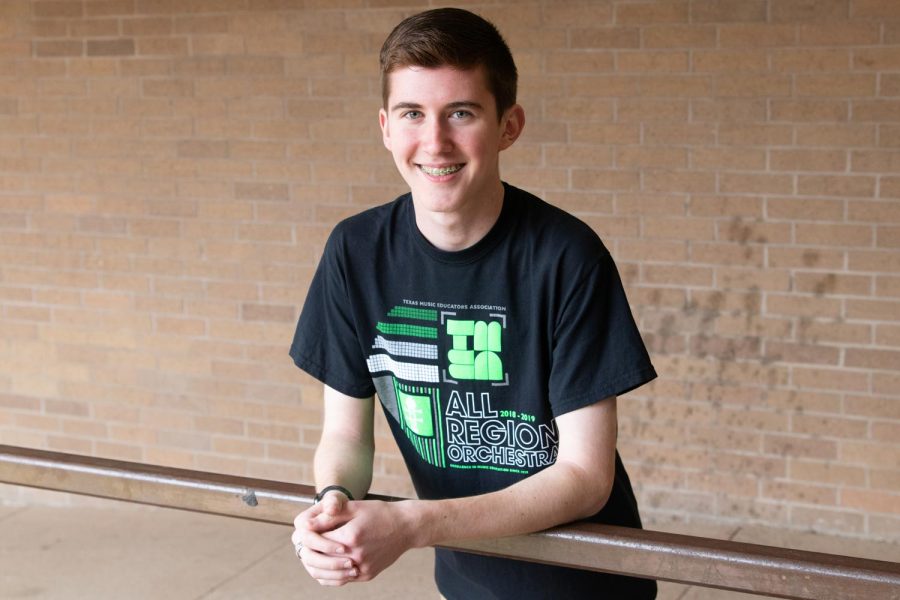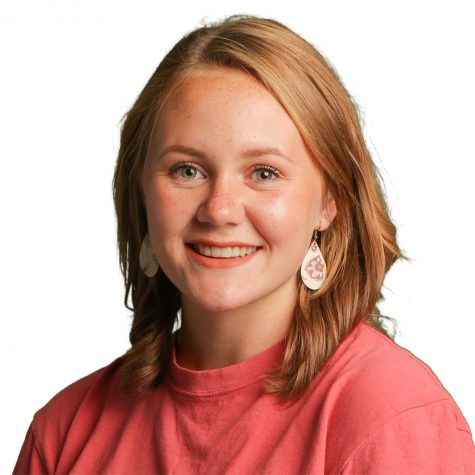Driven to succeed
More than just a National Merit finalist
Photo by Cameron Murry
With six AP classes on his belt, senior Carson McCarver continues to strive academically in his last year of high school. McCarver’s been involved in a NASA exploration program along with being in orchestra.
March 18, 2019
Pencil shavings and textbooks litter his desk as his fingers fly across the illuminated keyboard. Between the physics homework and his paper due at 10 p.m., most students would crack. The pressure would become too much, and they’d request a schedule change.
For Carson McCarver, it’s a delight. He pushes himself to turn in the assignments with full confidence and a sense of pride. His academic drive is unlike that of other seniors; it is what has allowed him to become a National Merit finalist, amongst his other achievements.
“The reason I would study for the PSAT, even when a lot of people would neglect it, was just that I knew that if I tried enough, I could’ve gotten the award, which led to better scholarships from colleges,” McCarver said. “A lot of times it’s really that end-end goal and, depending on what perspective I choose, it allows me to focus on something I would otherwise neglect.”
The work that he dedicates to academics doesn’t always feel like work. McCarver finds enjoyment in schoolwork.
“As far as performing to the best of my ability, that was always a thing,” Mccarver said. “It was an understood expectation since I can remember. Whenever I started to realize [math is] where my interest lies, it didn’t bother me to put so much effort into it. I just kept going because I knew I could.”
With so many organizations on his resume and involvement in orchestra, one would think that McCarver wouldn’t have the time to study so intensely. However, for McCarver, academics have been a clear priority, despite social conventions that suggest otherwise.
“I have generally found [the] perspective [that studying isn’t cool] to be rather silly,” McCarver said. “For some people, I get why they have those opinions, but for me it was not practical. I didn’t have a whole lot of social obligations [so I continued] pursuing academics instead.”
McCarver’s focus on schoolwork and his future have allowed him to reach that status of a National Merit finalist and get into Baylor University, the college of his choice. McCarver’s interest in the STEM field has shaped his focus and intended major. He was one of five students to participate in a NASA exploration program.
“I want to do mechanical engineering, or some form thereof,” McCarver said. “All of my interests lie in STEM, so it happened to be that whenever I was actually able to take those classes, I [found that] I actually do enjoy doing this and I know that whatever career I go into, I want to have that element there. That is why I chose engineering, because that is exactly the realm in which it lies.”
McCarver recognizes the relevance in what he’s learning and enjoys seeing the connections between math and science in everyday life.
“I was always the person that responds when someone asks when they can ever use this math in practical application,” McCarver said. “A combination of physics and calculus both [influenced my major], because they work together quite a bit. I know from other things that I like to research that [the skills] you’re learning have a direct application, and I can see the connections each time we learn something in those classes.”
Carson’s philosophy on life motivates him to stay on track for success. Rather than rely on outward motivation, he finds it within himself.
“I would think my guiding philosophy is to make sure you set goals based on how much you know of yourself,” McCarver said. “That requires you knowing what you’re good at, what you’re not, what you want to improve in; a very specific knowledge of your own mind, and then applying that. Everybody should set [a goal] that they know they can reach—and not necessarily [because] it’s easy to reach, but [because]they want to. [For me,] the ability to support a future family has always been the end goal.”
McCarver’s philosophy on goals and success is one that he encourages others to look at. He believes that knowing and believing in yourself go hand in hand. Without the internal will and drive to do better for oneself, it can be hard to get ahead. Challenging himself has been one of McCarver’s biggest focal points throughout his high school career.
“I knew that if I wasn’t trying and I didn’t take all the AP classes and such, that I would be lower than I knew I could be,” McCarver said. “Try to find the usefulness in what you’re doing, so it doesn’t seem pointless. If you’re just doing something to do it, then it seems like a waste of time. You’re spending hours doing this thing that you despise, as opposed to trying to see what use it has and where you can apply it.”
Making connections between education and real life scenarios is what makes McCarver unique; instead of becoming overwhelmed by derivatives and formulas, he sees it as an opportunity for insight.
“I’m looking forward to the next bit of learning,” McCarver said. “It’s going to be so much that I’ve had no experience with and had no exposure to.”
Through education, McCarver has found purpose.
“In some cases, there’s just always that sense that you could be doing more, to an extent,” McCarver said. “Everybody needs to be doing what their interests are and finding a way to use that, in some form or fashion. Don’t neglect things that might seem silly without giving them the proper thought.”















